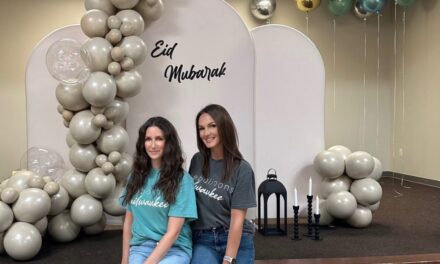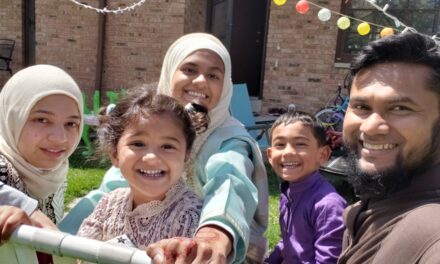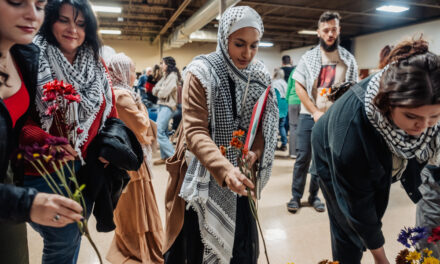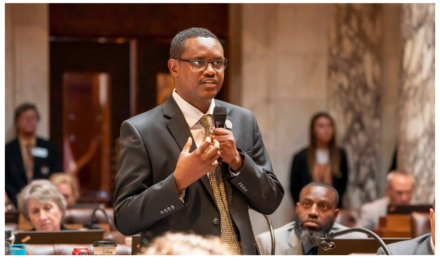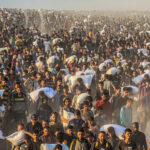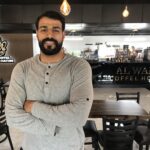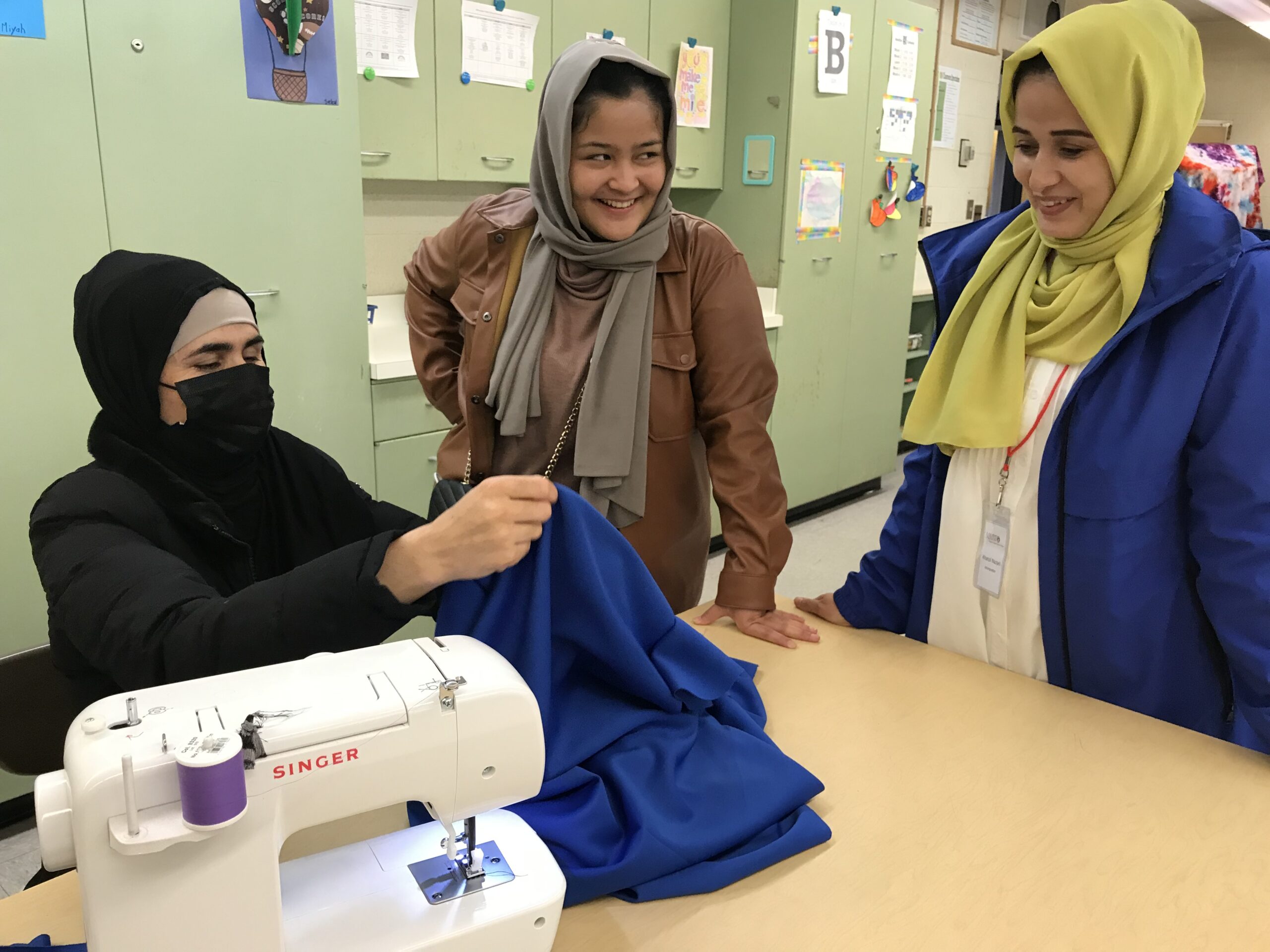
Photos by Cherrie Hanson
One of the Afghan participants shows her sewing technique to translators.
(Note: The women in the Sewing Circles Project requested that the Wisconsin Muslim Journal not use their names in telling this story).
A woman’s hand rests on shiny cobalt blue fabric as she gently guides it below the bobbing needle of a sewing machine.
She stops and looks up. Her eyes, bright blue like the cloth, shine in contrast to her black hijab and flowing black dress. They rest briefly on her young son who rolls across a giant beanbag behind her, then gaze back on the dress she is making.
Over a year ago, she was on a harrowing journey away from everything she knew as Afghanistan fell to Taliban control. After a two-day stop in Qatar, she found herself on a military base in the middle of the United States, where she lived in barracks with thousands of other evacuees from Afghanistan, waiting to be relocated to new homes somewhere in America.
Now on a cool Saturday afternoon in November, she and a dozen other Afghan women sit at large tables in front of sewing machines at Alexander Hamilton High School in Milwaukee. Each works with fabrics they selected to make clothing of their choice.
Meanwhile, her son runs back and forth between the women sewing and a big gym next door where volunteers supervise about 40 children who play games or work on art projects.
Even when refugees and other displaced people “embrace a move that takes them to a more stable and prosperous place, resettlement poses challenges of physical, psychological and cultural adaptation,” writes Lynne Williamson in a 2017 article in the Journal of Folklore and Education. “Many … ease transition by continuing, recreating or reinventing familiar art forms.”
That’s the idea behind Milwaukee Muslim Women’s Coalition’s sewing circles, said Rawand Yazaw, MMWC’s youth development director, who is managing the Sewing Circles Project. WMJ spoke to Yazaw, volunteers and participating Afghan women Nov. 5 in the midst of a sewing session.
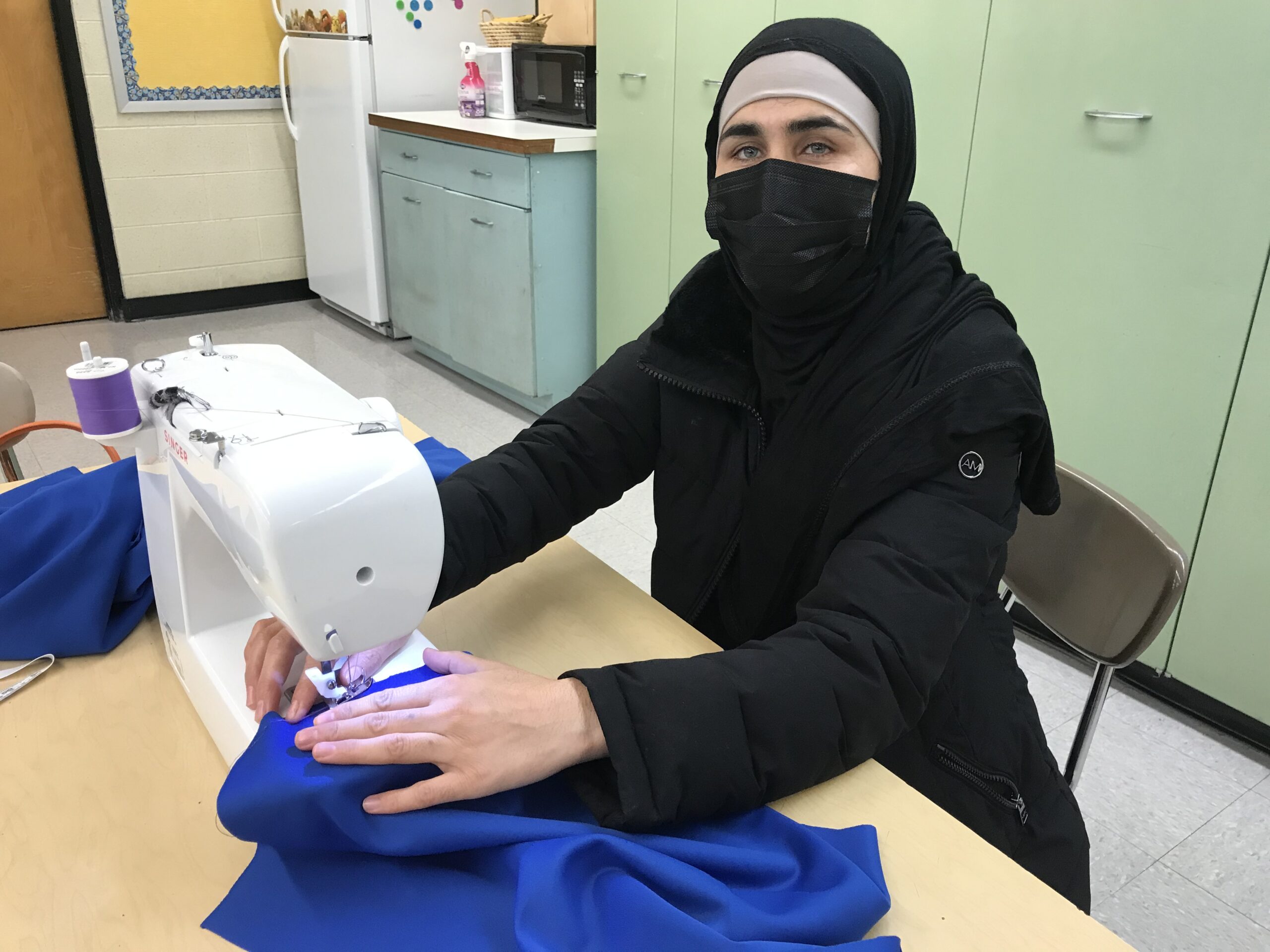
“These women had to leave everything behind but their skills. Many of them know how to sew and others like to learn. The sewing circles give moms a safe place to be together, share stories, and learn and grow together.”
Sewing circle participants do more than sew
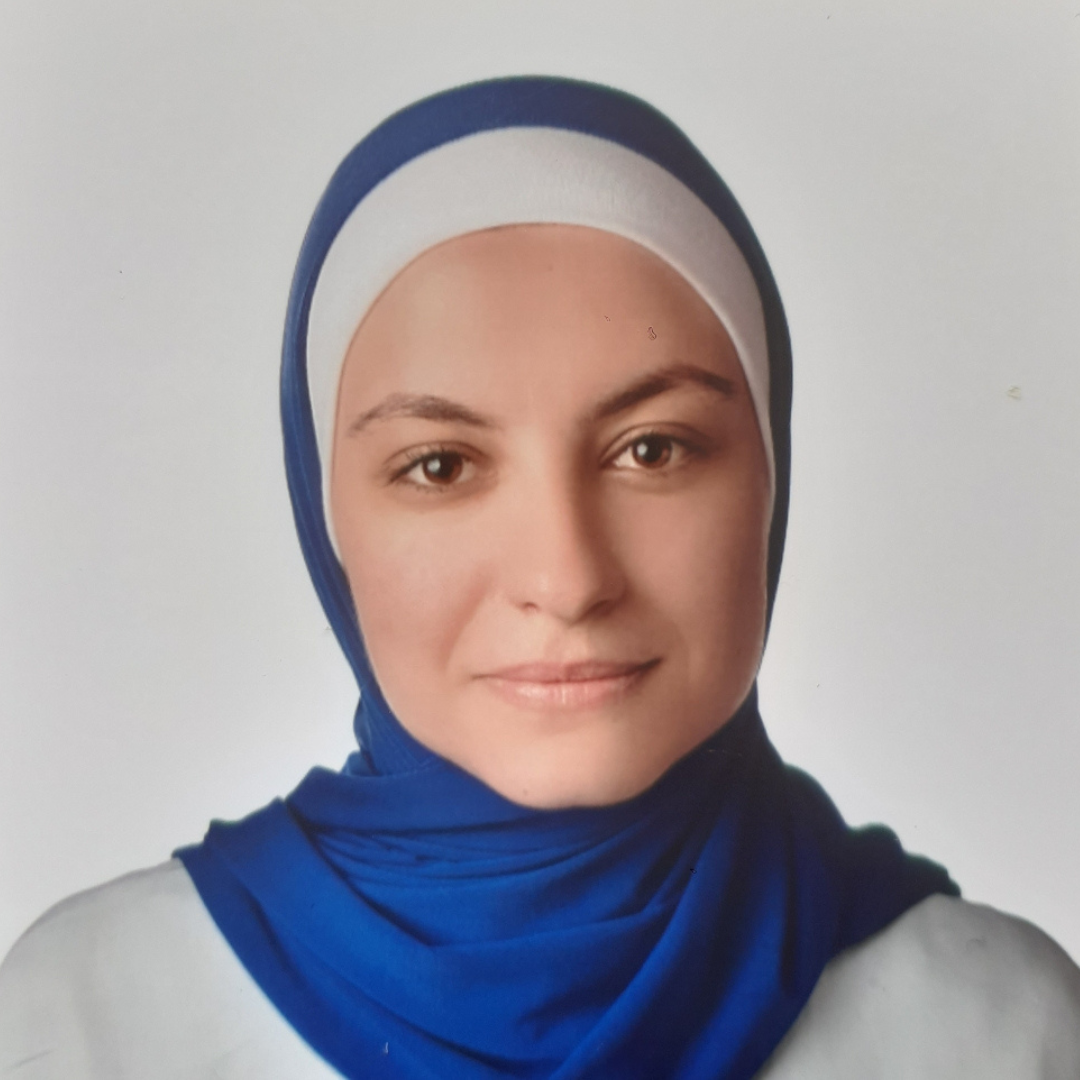
Rawand Yazaw, youth development director for Milwaukee Muslim Women’s Coalition
Afghan children and their mothers arrive at Hamilton High School on a big yellow school bus that picks them up at their homes. They are looking forward to an afternoon with friends, activities and lunch.
Sewing appears to be the perfect activity to engage Afghan women. Afghan women “are very proud of their culture and love their traditional clothes,” Yazaw explains. “Sewing may keep them attached to their heritage and identity.
“Sewing gives them agency to sew the type of clothes they want to wear. And many are very good at sewing. Sometimes they finish a whole piece in one session, therefore the need for more fabric is ongoing. Cash donations allow us to purchase the type of fabric they prefer for their clothing.
“There is a teacher who explains things but they are on top of it. They learn from each other. One of the refugees is now working as a seamstress in a well-known bridal shop. She makes it look easy.”
Williamson’s article explains that sewing circles and similar activities for immigrants:
- Provide opportunities for social interaction.
- Sustain the cultural heritage the newcomers bring with them.
- Offer technical assistance
- Improve English skills
- Help them learn to negotiate new social roles
- Develop marketable skills
- Share a healing connection with others harmed by political and personal trauma.
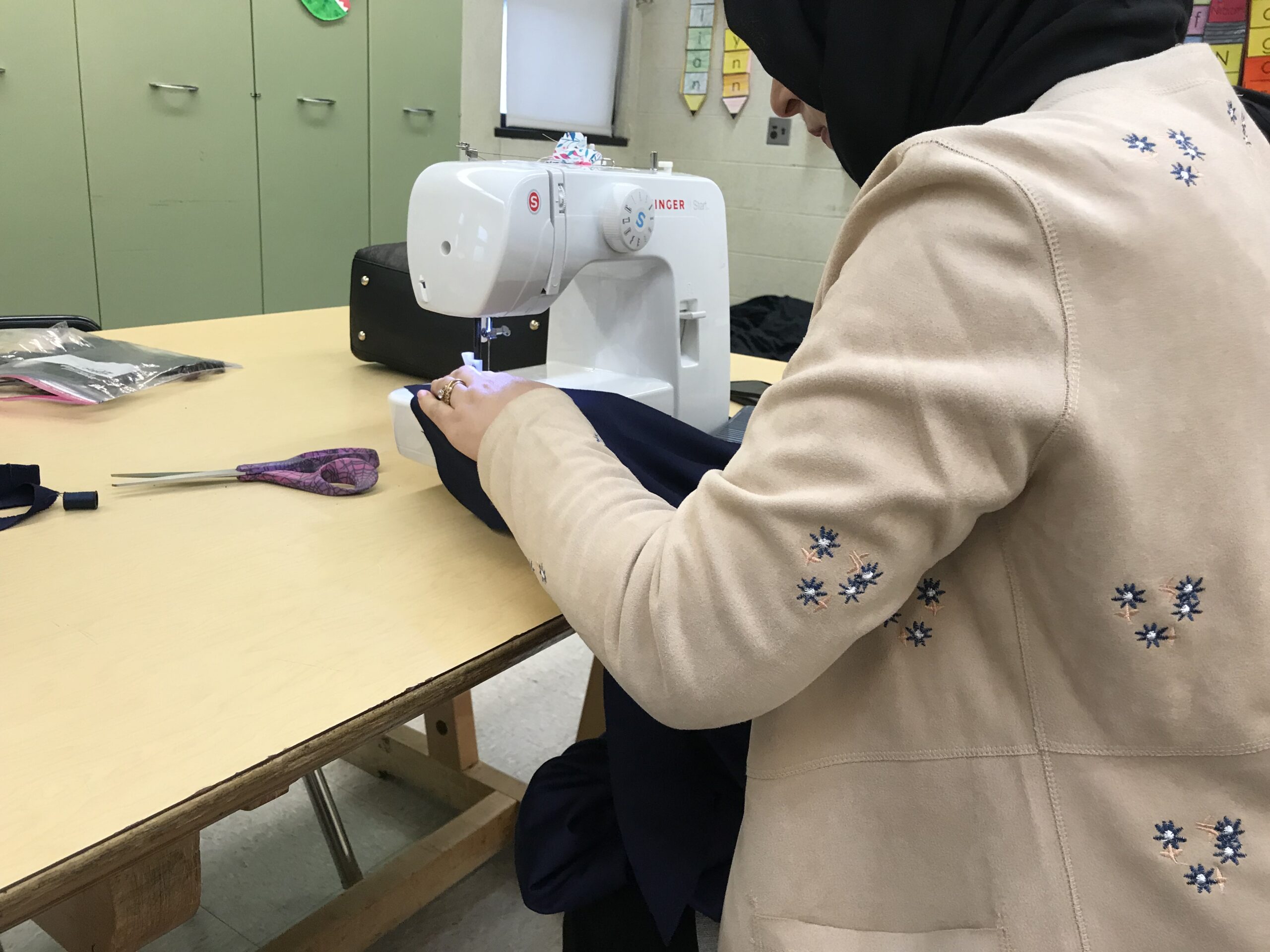
Another Afghan participant seems eager to share stories about some of the trauma she experienced. In understandable but halting English, she explains that she and her toddler arrived in Milwaukee in September after a year of waiting in Abu Dhabi.
She reunited with her mother-in-law here. She arrived eight months earlier but her husband is still in Afghanistan.
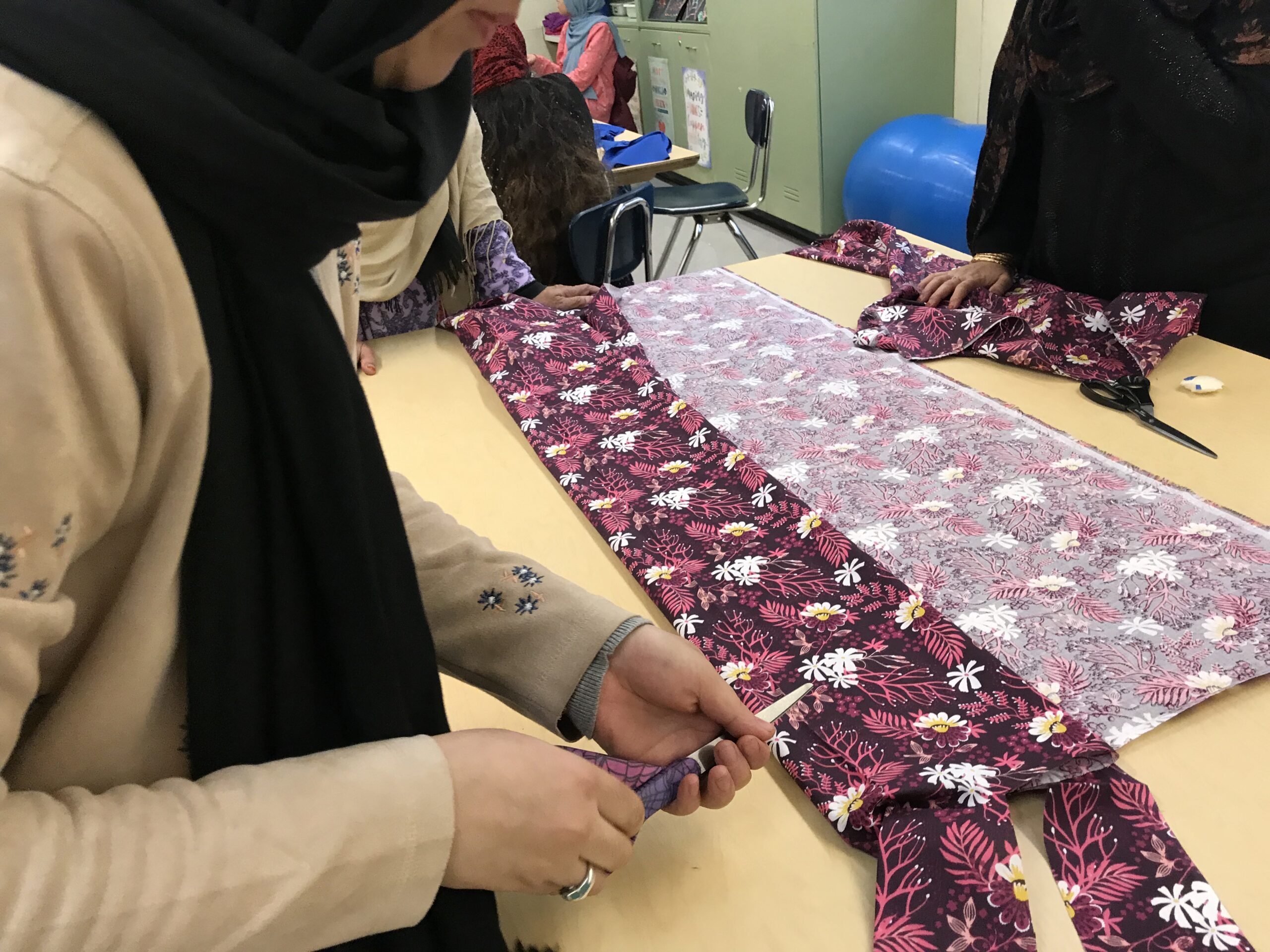
“It is hard for me because I don’t have my husband here and my mother-in-law is sick but I don’t have a car to take her to the doctor. Now I have to apply for asylum. It’s a long process.”
She is happy to attend the sewing circle mainly “because I want my son and mother-in-law to get out of the house and have fun. It gives us somewhere to go.”
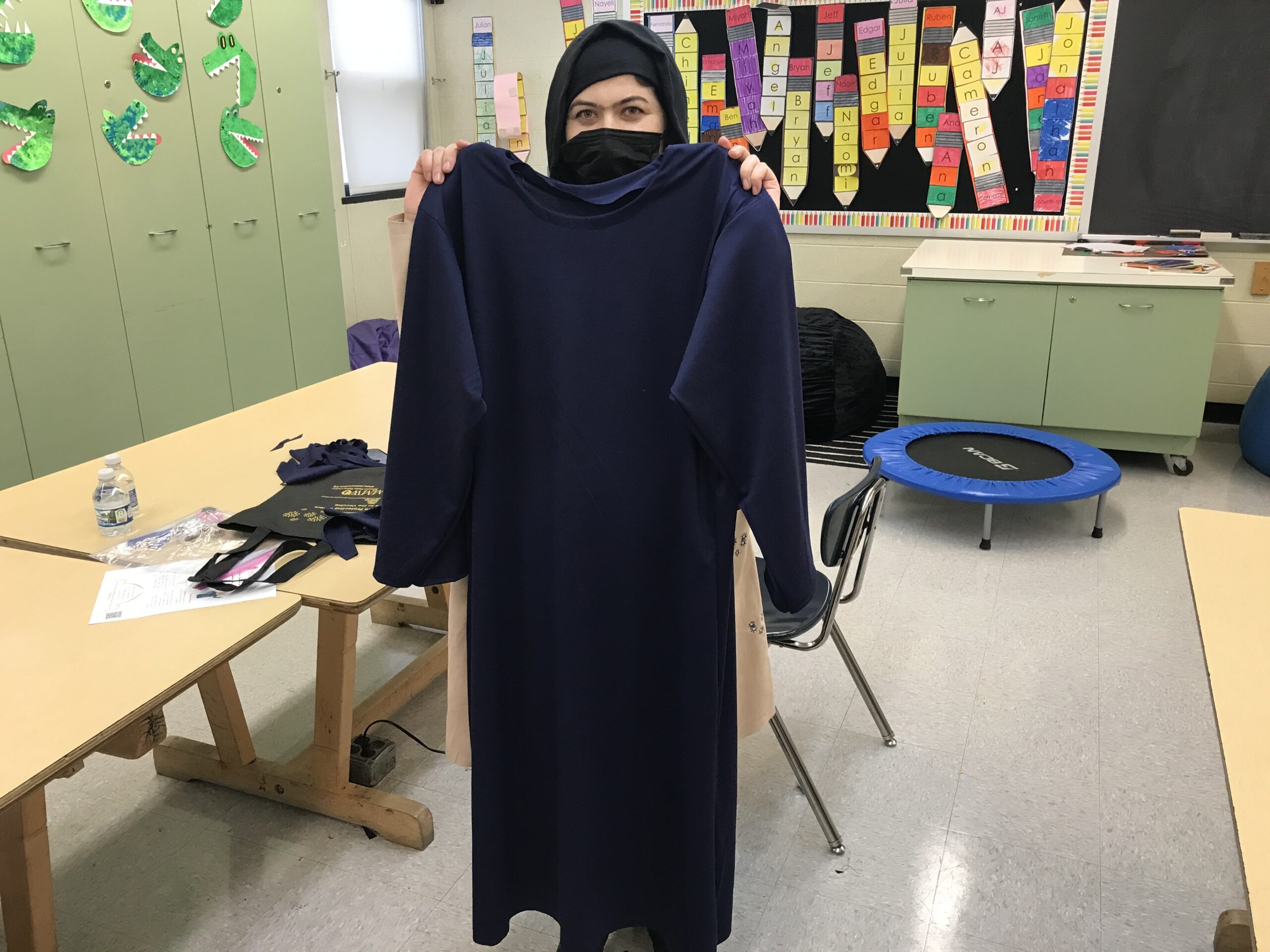
Another woman moves between the women, translating to American volunteers and guests. She is a refugee herself and it is her mother who is now working as a seamstress.
“She went to the interview and I went with her because she doesn’t speak English,” she says. “But when they saw how well she sews, they wanted her to start right away.
“Now she is confident. She makes friends at work. She has learned to get around by herself. That makes me really happy.
She remembers that just more than a year ago, she arrived to the U.S. with nothing. “I even lost my purse and cell phone,” she recalls. “A lady here in Milwaukee bought us a sewing machine. That changed everything.”
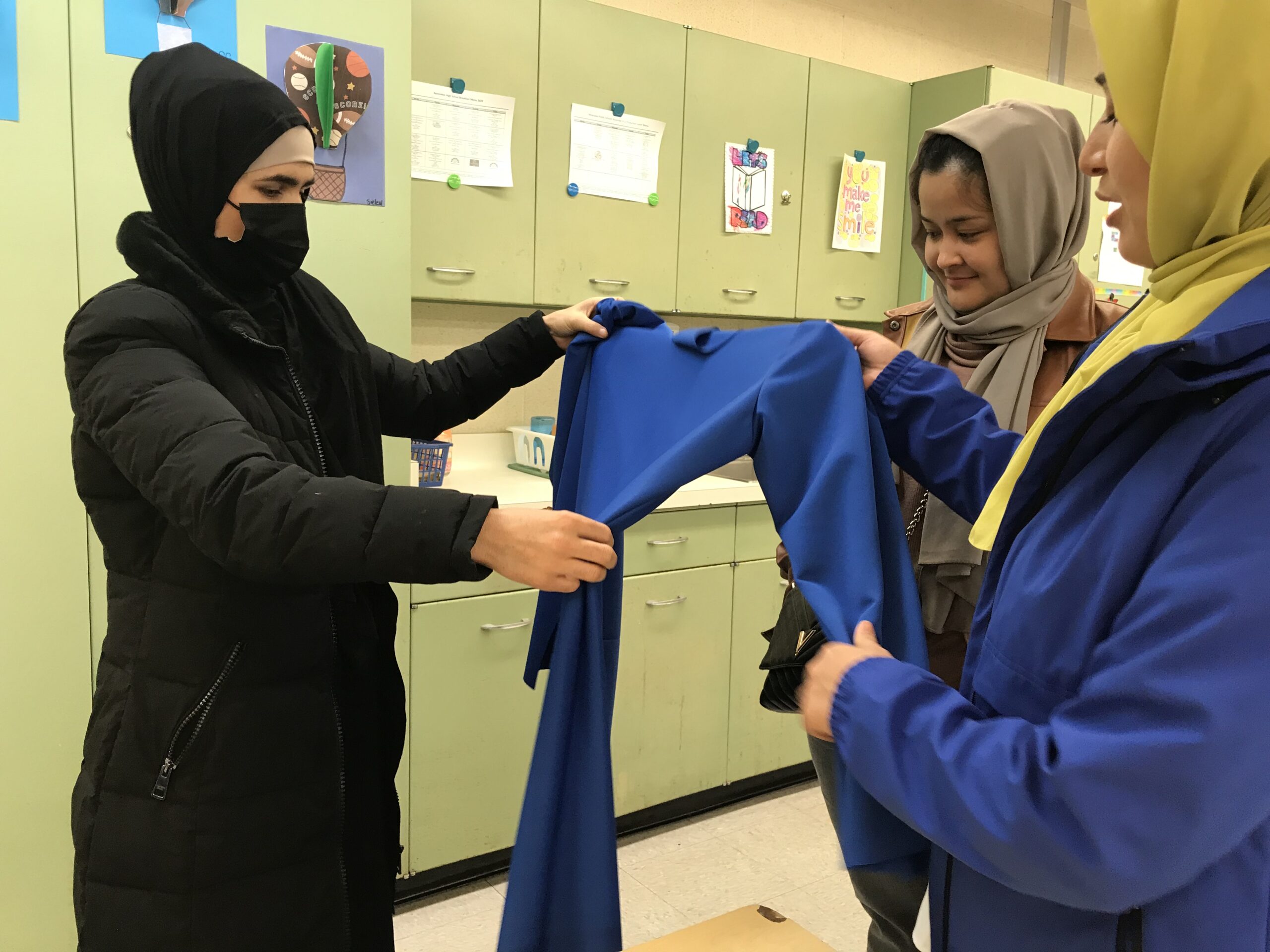
“We have expanded the programming we offer,” Yazaw says, “bringing in speakers to talk about healthy relationships, adapting to their new home and coping strategies. We want them to feel they have learned things.”
A participant holds up her full-length cobalt blue dress for her friends to admire. The elegant gown comes in at the waistline where it is tied with a sash. A woman across the room responds, holding up her own olive-green dress.
At the end of the session, the women gather their garments and their children to take the yellow school bus home.
MMWC’s developing relationship with Milwaukee’s Afghan community
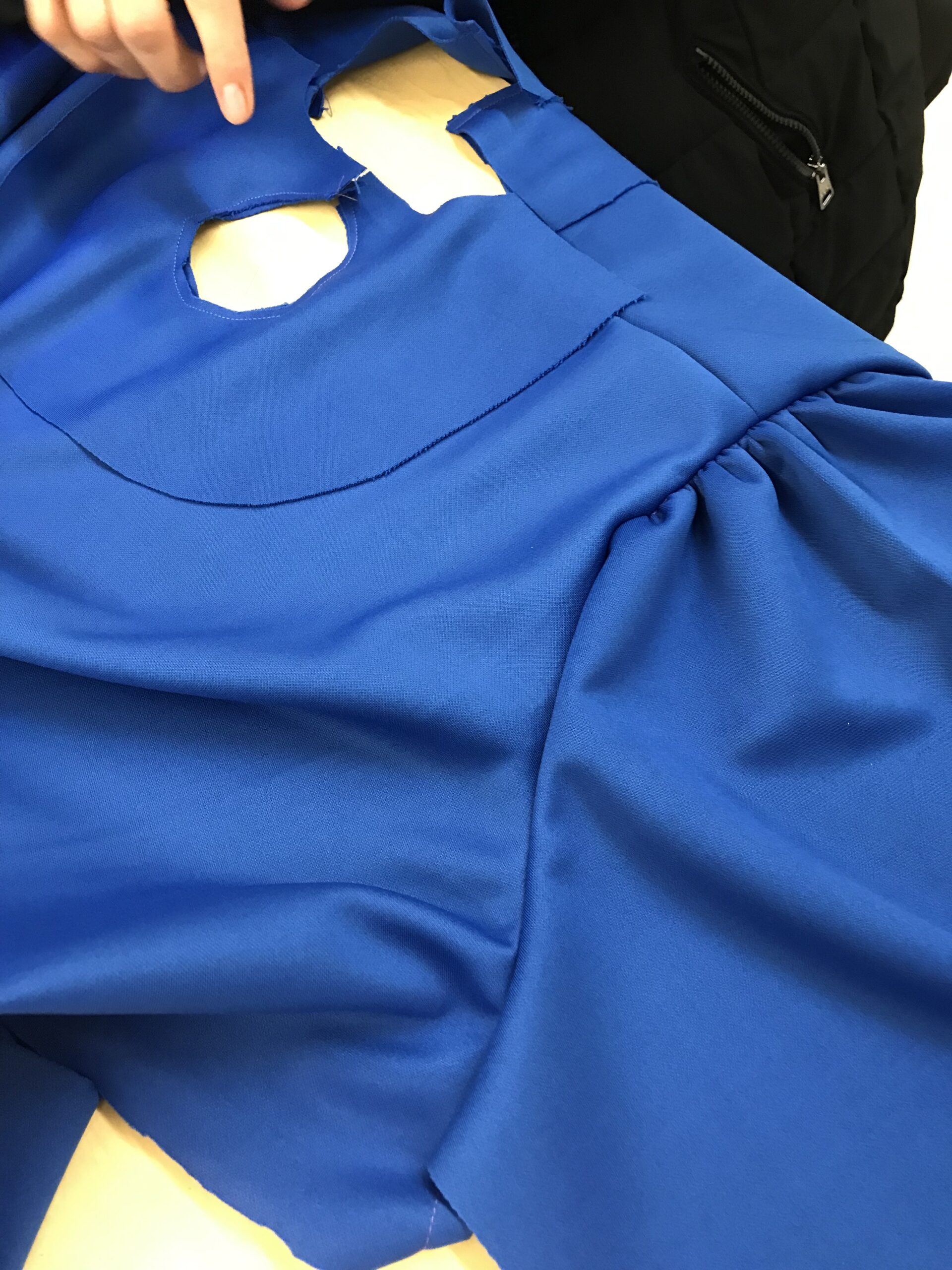
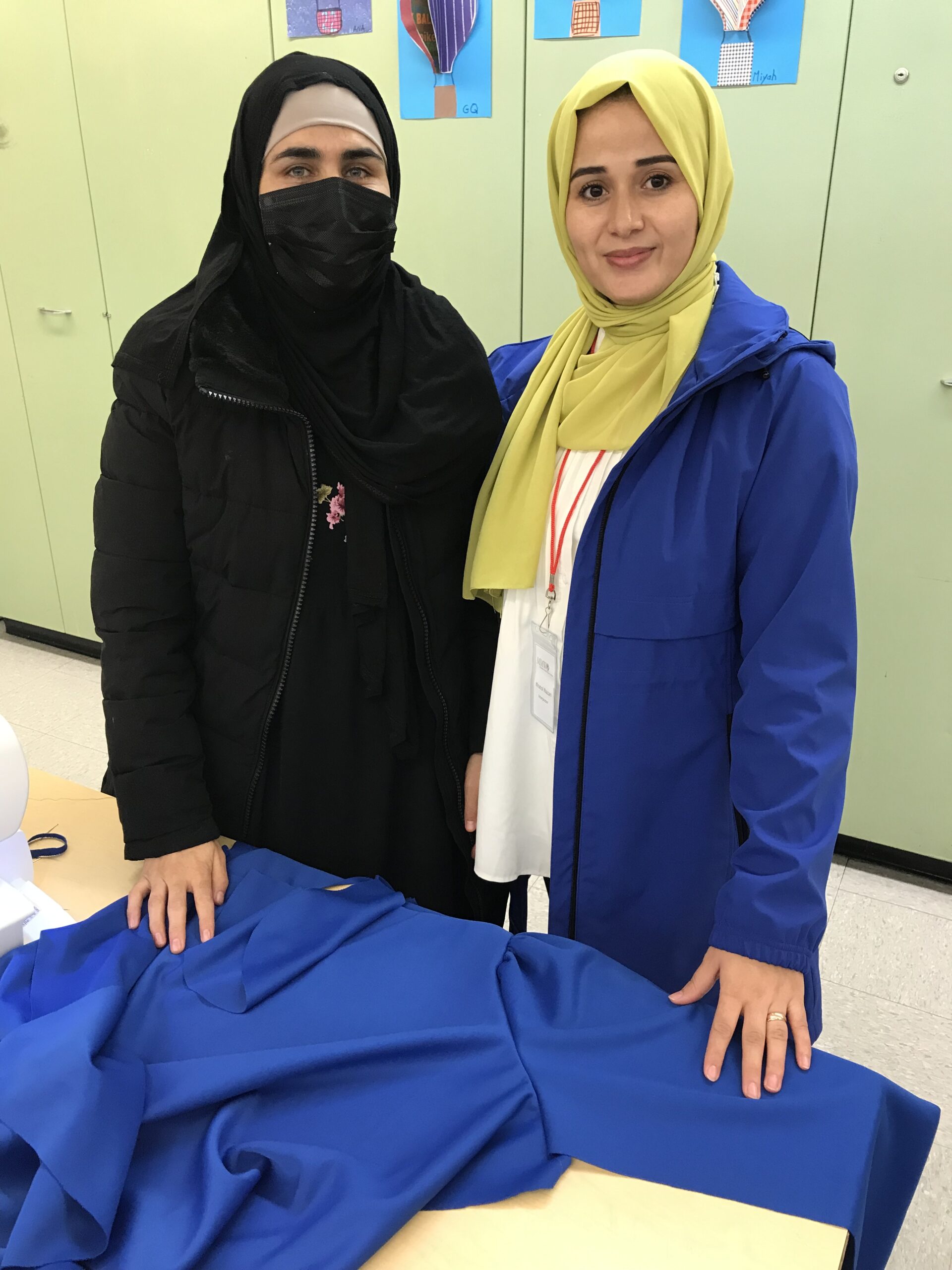
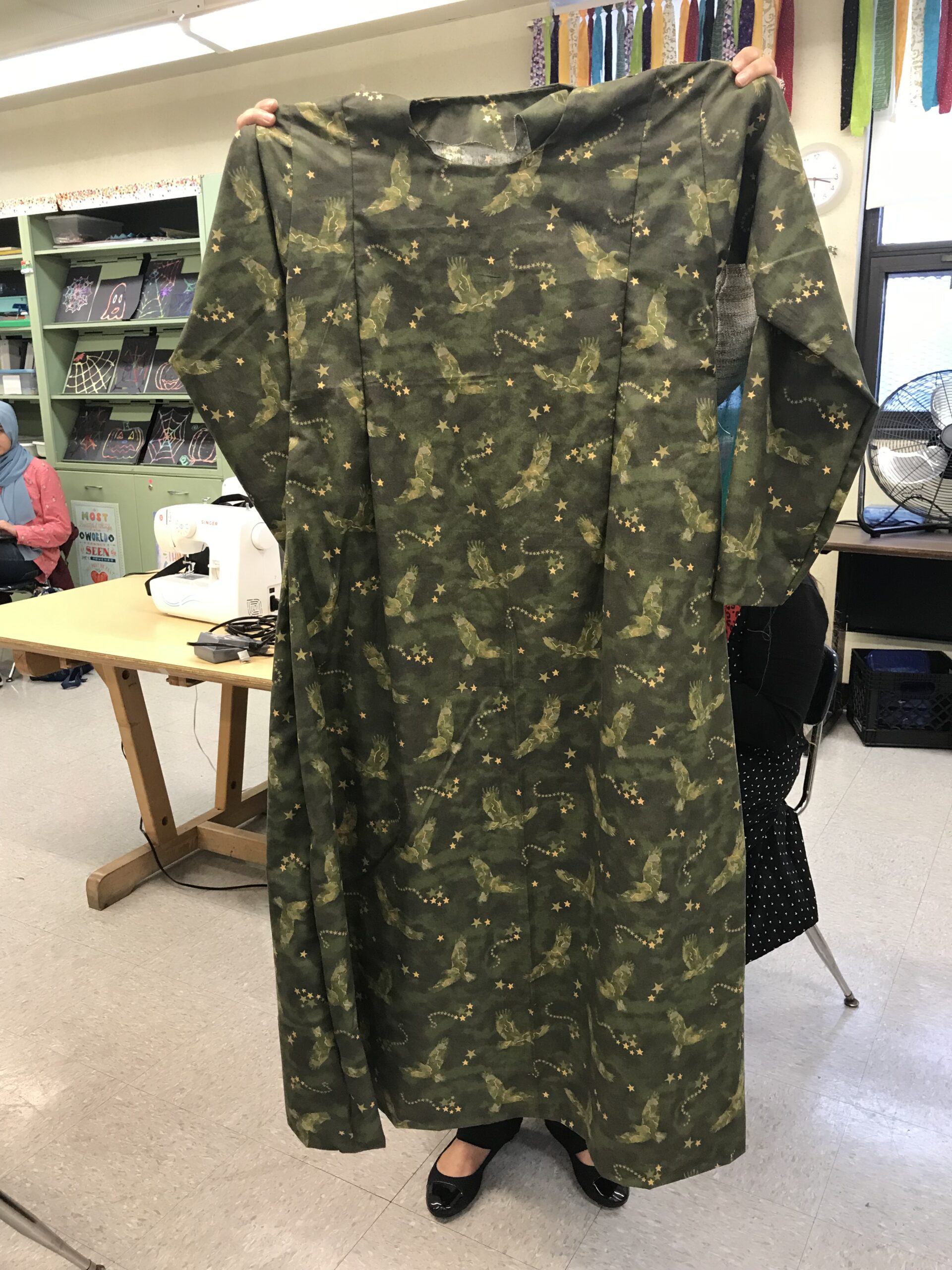
The Sewing Circles Project is an off-shoot of MMWC’s Be-a-Buddy Program, which connects re-settled Afghan children and teens with American peers. The Sewing Circles began Oct. 1, running in parallel to the already existing Be-a-Buddy Program, Saturday afternoon workshops for Afghan and American youth to participate in reading and team building activities, games, sports and art. Sometimes tutoring and homework is included, especially focusing on English.
The idea, Yazaw said, is that while Afghan children engage with American peers, their mothers and American women can come together for sewing and fellowship. The two programs are available to the about 400 Afghan people who have resettled in Milwaukee after fleeing Afghanistan in August 2021 in a U.S. military evacuation.
The growth of both programs has been organic. In September 2021, MMWC staff created activities for Afghan children and teens temporarily housed in hotels during the resettlement process. Volunteers drove Afghan youth and some parents to the Islamic Resource Center in Greenfield, where the children joined in fun activities.
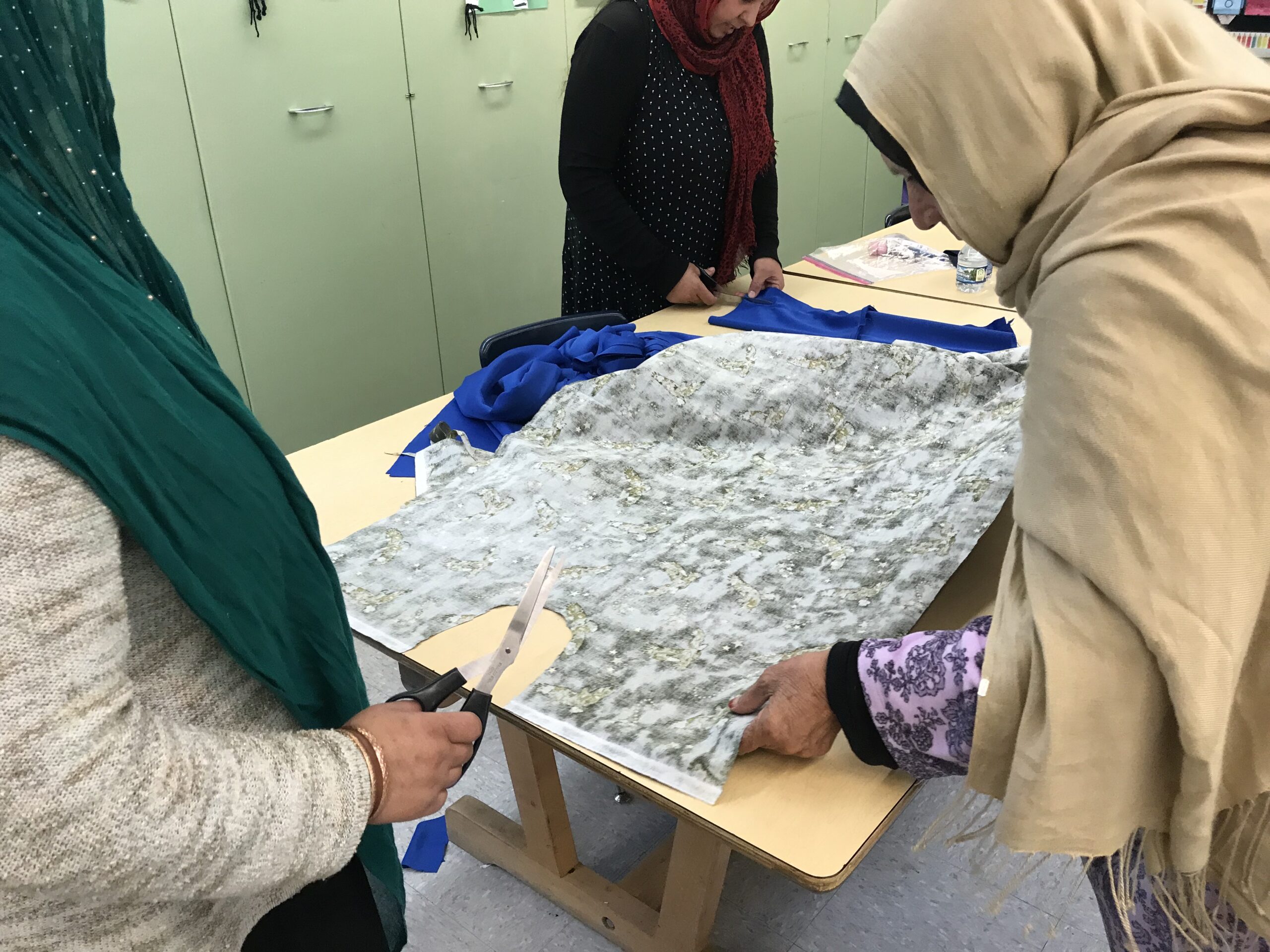
The purpose at the time was to help overtaxed Afghan parents who had to complete immigration paperwork while coping with children who had nothing to do, MMWC president Janan Najeeb told WMJ. That effort to fill the gap for Afghan families grew into a program to help Afghan youth create social connections in their new home.
“Some of the funding for both the sewing circles and the Buddy Program is from Welcome USA in collaboration with Marquette University and the MKE REC Partnership for the Arts and Humanities. Cost for lunches, fabric and transportation still have to be covered by private donations,” Najeeb said. All participants attend free of charge.
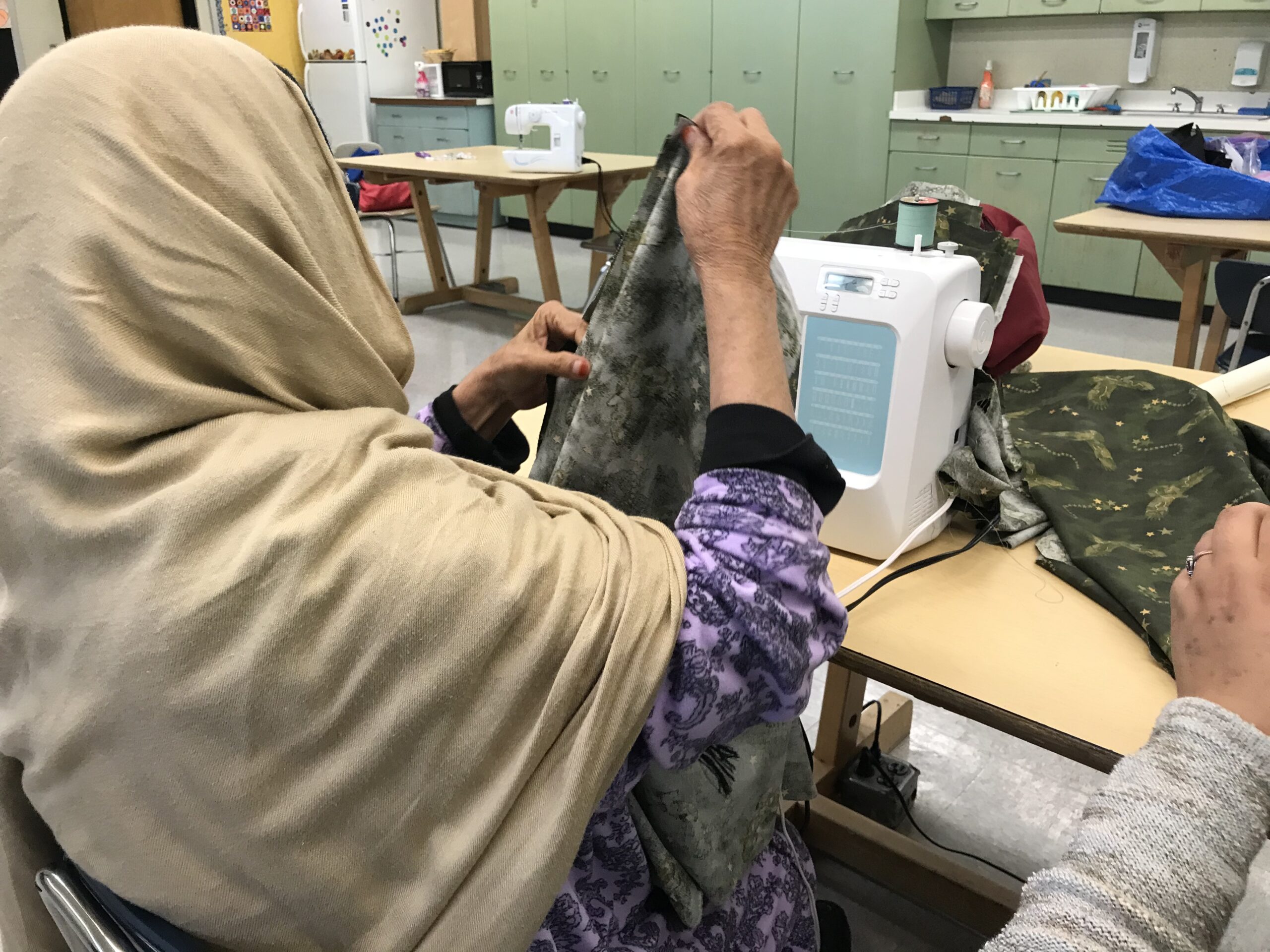
About 35 Afghan youth and 35 American youth volunteers participated in the first round of the Be-a-Buddy Program, which ran from mid-January through March this year and, after a pause for Ramadan, in May. When it started back up this fall, MMWC added sewing circles for Afghan women to give them an opportunity to be together, socialize and offer each other support.
In October, 56 Afghan youth and 13 women registered for the respective programs.
Now 80 Afghan youth and 27 women participate. And those numbers keep growing, Yazaw said.
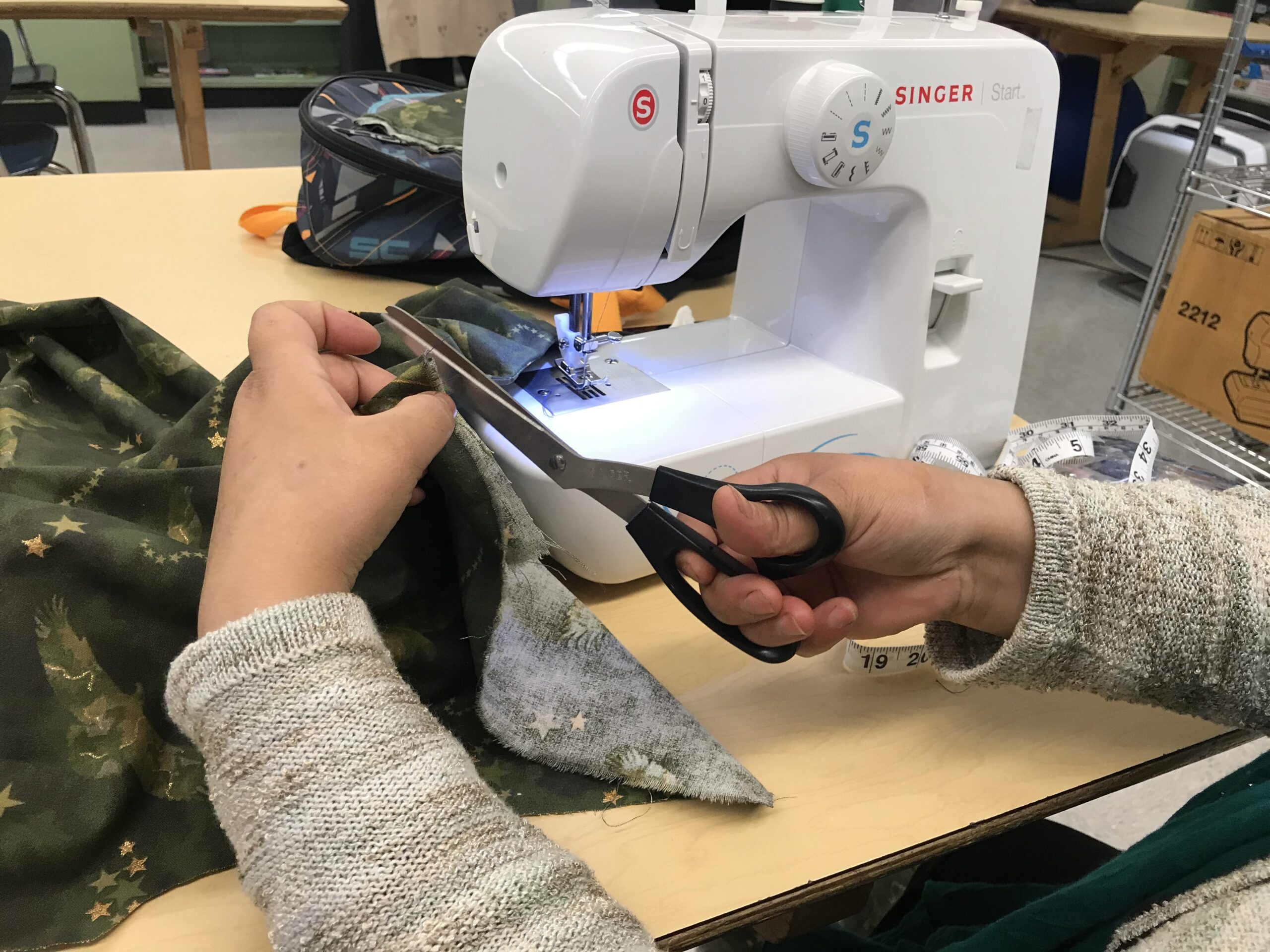
“Three more women signed up yesterday, and registered their kids in the Buddy Program. A new family coming today reached out to us because they heard about it from other women. Two more families will join next week.”
MMWC divided the families into two groups based on where they live. The groups take turns attending, Yazaw explained. That way the numbers are more manageable for transportation.
To help support the sewing circles, the Buddy Program, or to volunteer, please contact the Milwaukee Muslim Women’s Coalition at staff@mmwconline.org or 414-727-4900.
